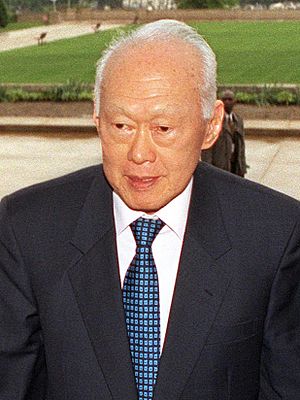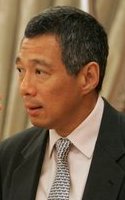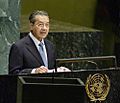Lee Kuan Yew facts for kids
Quick facts for kids
Lee Kuan Yew
|
|
|---|---|
|
李光耀
|
|

Lee Kuan Yew at the Pentagon in 2002.
|
|
| Minister Mentor of Singapore | |
| In office 12 August 2004 – 21 May 2011 |
|
| Prime Minister | Lee Hsien Loong |
| Preceded by | Position established |
| Succeeded by | Position abolished |
| Senior Minister of Singapore | |
| In office 28 November 1990 – 12 August 2004 |
|
| Prime Minister | Goh Chok Tong |
| Preceded by | S. Rajaratnam |
| Succeeded by | Goh Chok Tong |
| 1st Prime Minister of Singapore Elections: 1959-1988 |
|
| In office 3 June 1959 – 28 November 1990 |
|
| President | Yusof bin Ishak Benjamin Henry Sheares C. V. Devan Nair Wee Kim Wee |
| Deputy |
See list
Toh Chin Chye (1959–1968)
Goh Keng Swee (1968–1985) Goh Chok Tong (1985–1990) S. Rajaratnam (1980–1985) Ong Teng Cheong (1985–1990) |
| Succeeded by | Goh Chok Tong |
| Secretary-General of the People's Action Party | |
| In office 21 November 1954 – 1 November 1992 |
|
| Succeeded by | Goh Chok-Tong |
| Member of Parliament for Tanjong Pagar GRC Tanjong Pagar SMC (1955–1991) |
|
| In office 2 April 1955 – 23 March 2015 |
|
| Majority | Walkover |
| Personal details | |
| Born | successor5 16 September 1923 Singapore, Straits Settlements |
| Died | 23 March 2015 (aged 91) Outram, Singapore |
| Resting place | successor5 |
| Political party | People's Action Party |
| Spouse | |
| Children | Lee Hsien Loong Lee Wei Ling Lee Hsien Yang |
| Parent |
|
| Alma mater | Fitzwilliam College, Cambridge |
| Occupation | Politician |
| Profession | Lawyer |
| Awards | |
Lee Kuan Yew (born 16 September 1923 – died 23 March 2015) was a very important Singaporean politician. He was the first Prime Minister of the Republic of Singapore. He held this position for a long time, from 1959 to 1990.
He helped start the People's Action Party (PAP) and was its first leader. Under his leadership, Singapore became independent from Malaysia in 1965. He helped transform Singapore from a small, developing place with no natural resources into a successful and modern country. He is still seen as one of the most important political leaders in Southeast Asia.
After being Prime Minister, Lee Kuan Yew continued to serve Singapore. He was a Senior Minister under the second Prime Minister, Goh Chok Tong. Later, when his son Lee Hsien Loong became the third Prime Minister in 2004, Lee Kuan Yew took on a new role called Minister Mentor. He served in this role until 2011.
Lee Kuan Yew passed away on 23 March 2015, at the age of 91, due to pneumonia.
Contents
- Lee Kuan Yew's Family Life
- Lee Kuan Yew's Political Journey
- Prime Minister: Before Independence (1959-1965)
- Prime Minister: After Independence (1965-1990)
- Senior Minister (1990-2004)
- Minister Mentor (2004-2011)
- Death of Lee Kuan Yew
- Lee Kuan Yew's Legacy
- Awards and Recognition
- Images for kids
- See also
Lee Kuan Yew's Family Life
Lee Kuan Yew was a fourth-generation Chinese Singaporean. His great-grandfather came to Singapore from China in 1862. Lee Kuan Yew was born in Singapore and was the oldest child of Lee Chin Koon and Chua Jim Neo. He was greatly influenced by British culture because his grandfather had given his sons an English education.
Lee Kuan Yew married Kwa Geok Choo on 30 September 1950. They had two sons, Lee Hsien Loong and Lee Hsien Yang, and one daughter, Lee Wei Ling.
Many of Lee Kuan Yew's family members have important jobs in Singapore. His older son, Lee Hsien Loong, became the Prime Minister of Singapore in 2004.
Early Life and Education
Lee Kuan Yew went to Telok Kurau Primary School and Raffles Institution. His studies were interrupted by World War II and the Japanese occupation of Singapore from 1942 to 1945. During this time, he learned Chinese and Japanese. He even worked for the Japanese, helping to translate news reports.
After the war, he went to Fitzwilliam College, Cambridge University in England to study law. He did very well in his studies. He returned to Singapore in 1949 and started working as a lawyer.
Lee Kuan Yew's Political Journey
Starting in Politics (1951-1959)
Lee Kuan Yew first got involved in politics by helping a pro-British party in 1951. However, he soon realized that this party would not get much support from ordinary people, especially Chinese workers. He found his true calling when he became a legal advisor for trade and students' unions. This connected him with the Chinese-speaking working class.
Forming the People's Action Party (PAP)
On 12 November 1954, Lee Kuan Yew and a group of educated friends started the People's Action Party (PAP). They joined forces with trade unionists who had strong support from many people. Their main goals were to gain self-government for Singapore and end British rule. Lee Kuan Yew became the party's leader, a position he held until 1992.
Becoming an Opposition Leader
In the 1955 elections, Lee Kuan Yew won the Tanjong Pagar seat. He became the leader of the opposition against the government at the time. During this period, he worked hard to prepare for Singapore's future.
Prime Minister: Before Independence (1959-1965)
Leading Self-Governing Singapore (1959-1963)
In the 1959 elections, the PAP won a large majority of seats. Singapore gained self-government, meaning it could manage all its own affairs except defense and foreign policy. On 5 June 1959, Lee Kuan Yew became the first Prime Minister of Singapore.
He faced many challenges, such as providing good education, housing, and jobs for the people. There were also political disagreements within his party. Some members left to form a new party called the Barisan Sosialis. This made the PAP's majority in the assembly very small.
Joining and Leaving Malaysia (1963-1965)
In 1961, the Prime Minister of Malaya, Tunku Abdul Rahman, suggested forming a larger country called the Federation of Malaysia. This federation would include Malaya, Singapore, Sabah, and Sarawak. Lee Kuan Yew strongly supported this idea, believing it was important for Singapore's survival. In a public vote in 1962, 70% of Singaporeans supported joining Malaysia.
On 16 September 1963, Singapore became part of Malaysia. However, this union did not last long. The Malaysian government was concerned about Singapore's large Chinese population and the PAP's growing influence. Lee Kuan Yew also disagreed with some of Malaysia's policies.
There were also serious race riots in Singapore in 1964, which caused many deaths and injuries. It was a very difficult time. Because of these problems, the Malaysian Prime Minister decided to remove Singapore from Malaysia.
Lee Kuan Yew tried to find a solution, but it was not possible. On 7 August 1965, he signed an agreement for Singapore to separate from Malaysia. This was a very sad moment for him, as he had strongly believed in the merger. In a televised speech, he became emotional as he announced the separation.
On 9 August 1965, Singapore officially became an independent and sovereign nation. Lee Kuan Yew and his government now faced huge challenges. Singapore had no natural resources, its water supply depended on Malaysia, and it had a very small defense force.
Prime Minister: After Independence (1965-1990)
After Singapore became independent, Lee Kuan Yew worked hard to get other countries to recognize Singapore. Singapore joined the United Nations in 1965 and helped found the Association of Southeast Asian Nations (ASEAN) in 1967. He also worked to build good relationships with neighboring countries like Indonesia.
Lee Kuan Yew and his government focused on creating a unique Singaporean identity. They wanted people from different races and religions to live together peacefully. They made sure that everyone respected each other's beliefs and cultures.
Key Decisions and Policies
During his time as Prime Minister, Lee Kuan Yew focused on three main areas: keeping Singapore safe, growing the economy, and solving social issues.
National Security
Singapore was very vulnerable after independence. There were threats from different groups and countries. Lee Kuan Yew quickly sought international recognition for Singapore's independence. He decided that Singapore would be neutral and not take sides in international conflicts, similar to Switzerland. At the same time, he asked Goh Keng Swee to build up the Singapore Armed Forces (SAF) and sought help from other countries for training.
Government Policies
Lee Kuan Yew believed in having a clean and honest government. He introduced laws to give the Corrupt Practices Investigation Bureau (CPIB) more power to investigate corruption. He also believed that government ministers should be paid well to attract talented people and prevent corruption.
In the late 1960s, Singapore's population was growing very fast. Lee Kuan Yew started a "Stop-at-Two" family planning campaign to encourage families to have only two children. This was to prevent the population from growing too quickly and putting a strain on the economy.
Later, in 1983, he encouraged educated women to have more children. He was worried that many educated women were not getting married or having children. He even set up a match-making agency to help educated men and women meet. He also offered benefits like tax rebates for graduate mothers who had more children.
Corporal Punishment
Lee Kuan Yew believed that corporal punishment (like caning) was an effective way to maintain discipline. He himself was caned in school for being late and felt it did him no harm. His government continued and expanded the use of judicial caning for certain crimes. Caning was also introduced in the Singapore Armed Forces to maintain military discipline.
Relations with Malaysia
Lee Kuan Yew worked to improve relations with Mahathir Mohamad, who later became the Prime Minister of Malaysia. They met in 1978 and built a good relationship. They agreed to cooperate on important projects, like building the Linggui dam on the Johor River in 1988.
Senior Minister (1990-2004)
After leading the PAP to victory in seven elections, Lee Kuan Yew stepped down as Prime Minister on 28 November 1990. He handed over the role to Goh Chok Tong. At that time, he was the world's longest-serving Prime Minister.
This was the first time Singapore had a change in leadership since independence. Lee Kuan Yew remained in the government as a Senior Minister. In this role, he gave advice to the new Prime Minister. He still had a lot of influence in the country. He famously said that even from his sick bed, he would get up if he felt something was going wrong with Singapore.
Minister Mentor (2004-2011)
In the early 2000s, Lee Kuan Yew was concerned that younger Chinese Singaporeans were not speaking Mandarin well. He encouraged them to learn and use both English and Mandarin. He even published a book called Keeping My Mandarin Alive in 2005, sharing his efforts to master the language.
He also spoke about the importance of having new, talented leaders for Singapore's future. He believed that leaders needed to be smart, open to new ideas, and dedicated to serving their country. He retired from politics in 2011.
Death of Lee Kuan Yew
On 5 February 2015, Lee Kuan Yew was hospitalized with severe pneumonia. He passed away on 23 March 2015, at the age of 91. His state funeral was held on 29 March 2015.
Lee Kuan Yew's Legacy
During the 31 years Lee Kuan Yew was Prime Minister, Singapore changed from a developing country to one of the most successful nations in Asia. This happened despite Singapore being small, having limited land, and no natural resources. Lee Kuan Yew often said that Singapore's only resources were its people and their hard work. Many Singaporeans, especially older generations, greatly respect him for his leadership during Singapore's early years.
However, some people have criticized Lee Kuan Yew for being too strict and not allowing much disagreement. They point to his lawsuits against political opponents and newspapers.
His Books
Lee Kuan Yew wrote two books about his life and Singapore's history:
- The Singapore Story: This book covers Singapore's history until its separation from Malaysia in 1965.
- From Third World to First: The Singapore Story: This book tells how Singapore became a developed nation after independence.
Awards and Recognition
Lee Kuan Yew received many awards and honors from different countries. These include:
- The Order of the Companions of Honour (1970)
- Knight Grand Cross of the Order of St Michael and St George (1972)
- The Freedom of the City of London (1982)
- The Order of the Crown of Johore First Class (1984)
- The Order of Great Leader (1988)
- The Order of the Rising Sun (1967)
- In 2006, he received the Woodrow Wilson Award for Public Service.
- In 2009, he received the first Lifetime Achievement award from the U.S.-Asean Business Council.
- Also in 2009, he was given the Russian Order of Friendship by President Dmitry Medvedev.
Many world leaders, like Dr Henry Kissinger and U.S. President Barack Obama, have praised Lee Kuan Yew for his wisdom and for helping to create the "Asian economic miracle."
Images for kids
-
Colonial Secretary Alan Lennox-Boyd led the British negotiations with the Singapore delegation.
-
Lee Kuan Yew and his wife Kwa Geok Choo with United States President Ronald Reagan and his wife Nancy Reagan on 8 October 1985 at the White House
-
National Flag at half-mast at Nanyang Technological University following the death of Lee Kuan Yew
-
Lee receives the Order of Friendship from Russian President Dmitry Medvedev on 15 November 2009 in Singapore
See also
 In Spanish: Lee Kuan Yew para niños
In Spanish: Lee Kuan Yew para niños
 | Audre Lorde |
 | John Berry Meachum |
 | Ferdinand Lee Barnett |
















